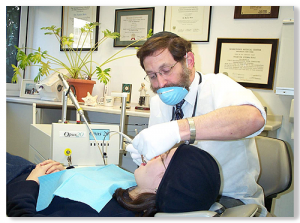why have dental implants become so popular? They're faster, easier and better than ever before.
Dental implants have been actively around for well over 50 years now. In fact doctors like Alvin Strock in the 
Part of what revolutionized acceptance of dental implants was the almost accidental discovery by Dr. Branemark of Sweden and his scientific documentation during the 1970's and 80's. One of the true pioneers of the field, Jack Wimmer, was honored this year for his almost exclusive contributions to the field from the 60's up until today.
Wimmer, a Jewish holocaust survivor from Cracow, still comes to Israel from the U.S. regularly sharing with us his vast knowledge and experience. Branemark helped explain what Wimmer knew and Linkow did titanium fuses with bone, predictably.
As things turn out, while we perform the technicalities of placing the implants, G-d miraculously handles the rest. When titanium, an element found in abundance in nature, is exposed to air (oxygen) it forms an "oxide" layer. This oxide layer is microscopically identical to bone. The bone is so comfortable with titanium that the bone fuses to this titanium oxide. Once this fusion takes place the titanium implant is more difficult to remove than a tooth. As titanium doesn't decay, it is usually more durable than even a natural tooth
What has changed is that we now know in retrospect which materials and designs predictably hold up 10-20 years or more. Surgeries once complex and often done under general anesthesia in an operating room now take minutes with a local anesthetic often less than that used for a routine filling. In fact, with the rapid development of dental lasers and other techniques and technologies, many accepted concepts regarding dental implants continue to fall by the wayside.
Often, surgery and stitching is no longer necessary; certainly not multiple surgeries. Four to six month waiting periods and CT scans as well are often no longer required. Implant placement can now almost routinely be done in minutes with teeth placed the same day, restoring com
fort and aesthetics without the need to wait months, to be without teeth, or have to wear removable dentures. In fact, with dental lasers, implants can often be placed without any injections or anesthetics at all, no stitches and little, if any, significant bleeding.
Whether performed more traditionally (involving cutting, stitching and waiting), or with newer techniques without these steps, dental implants usually involve 3 stages.
An implant is not a tooth, but a root replacement. It replaces a missing root (the part in the bone, underneath the gums). The next step involves placement of a "post" which replaces the neck of the tooth, or the part that connects the portion of the tooth under the gums (the root) with the portion above the gums.
The third part is the tooth itself which is what people are really coming for, so that they can function and feel comfortable. As an implant is not a tooth per se, but the foundation for teeth, there may be more than one implant per tooth or more than one tooth per implant.
The teeth might be "fixed" (non-removable), or snap on and off, depending on one's individual needs. Of course a doctor with extensive experience can best help one decide which approach would probably work best for them. While promises can never be made, it's not the type of thing one does every day and it would be wise to get the opinion of a doctor with the appropriate long-term experience.
What can you look for ? Firstly, ask your doctor how many implants he/she has done and how long they have been involved in the field. Israel has doctors with 1 5-20 years experience who have placed and restored thousands of implants.
Are they a member of internationally recognized implant organizations?
While oral implantology is not a recognized separate specialty in Israel, your doctor might be a Fellow or Diplomate of the American Academy of Implant Dentistry, American Board of Oral Implantology, or the like. An oral surgeon or periodontist is not necessarily a member of the implant academies. Ideally, your doctor should not only be trained and experienced in the surgical aspect of the implants, but as well in the "prosthetic", or tooth restoration aspect, as that is really the goal of, and the need of, patients seeking implants.
If your doctor is recommending CT's, multiple surgeries, "sinus lifts", extensive bone grafting, long waiting periods, temporary dentures, etc., you might want to get a second opinion. Lasers are not absolutely necessary for dental implants but they do definitely provide for an experience at a different level.
So, if you want to look good, feel good, and be done with your dental needs, you might want to take a closer look at the fascinating developments of dental implants. They're not perfect, but certainly provide a quality of life for many that was once never even dreamed of.
Thousands of people in Israel have benefited from dental implants and your doctor would probably be happy to share with you names of such people. These people often become "dental missionaries", spreading the word so that others can benefit from this wonderful advance in dentistry.
No one implant type is best for everyone, and again, an experienced doctor working with the many available systems can offer you the best advice on what would probably work best for you. Doing it right the first time can help avoid unnecessary disappointment. Speak to your doctor who may be doing one or more stages of the implant procedure and/or who might direct you to a doctor who is. Implants have unquestionably revolutionized dentistry as have dental lasers. These developments are here to stay and have made possible, for many, a quality of life previously not readily available
Dr. Stern practices in Jerusalem and is actively involved in Israeli and international societies of dental implants and dental lasers.
